




Having trouble with your dishwasher soap not dissolving during the cleaning cycle? This can be a frustrating problem and may leave your dishes looking dirty or poorly cleaned. In this article, we will explore the possible causes and solutions to help you get your dishwasher back in optimal working condition.
One of the first signs that there may be a problem with your dishwasher soap dissolving is if you notice tablets or pods stuck in the dispenser after a recent wash cycle. This could indicate that the dispenser isn’t opening or the detergent isn’t being sprayed properly. There are a few common causes for this issue, which we will delve into below.
Firstly, a faulty or broken heating element can prevent the water from reaching the required temperature for effective dissolving of the detergent. If the water is not hot enough, the detergent may not dissolve properly, resulting in residue on the dishes. You can test the heating element by running the dishwasher on the highest possible temperature and checking if the water gets hot enough. If not, a replacement may be necessary.
Another possible cause could be a clogged or blocked circulation pump. The circulation pump is responsible for spraying water around the dishwasher during the cleaning cycle. If it is not working properly, the water will not be able to effectively dissolve the detergent and clean the dishes. Check for any debris or buildup in the pump and clean it out if necessary.
Furthermore, the placement of dishes and the spray arms can also affect the detergent dissolving. If the dishes are overcrowded or blocking the spray arms, the water may not be able to circulate freely and reach the detergent. Make sure to load the dishwasher properly, leaving enough space for the water to flow and the spray arms to rotate.
Lastly, a malfunctioning or missing spring that holds the detergent dispenser closed during the wash cycle can also cause the dishwasher soap not dissolving. If this is the case, a replacement spring is needed. Alternatively, if you have recently switched detergent brands, it is possible that the new product is not compatible with your dishwasher. Be sure to read the instructions and recommendations from the manufacturer to ensure they work together effectively.
By troubleshooting these possible causes, you can help prevent damage to your dishwasher and ensure that your dishes come out clean and sparkling every time. Remember to always follow the manufacturer’s instructions and consult a professional if you are unsure about making any repairs yourself.
Reasons Why Dishwasher Soap Not Dissolving
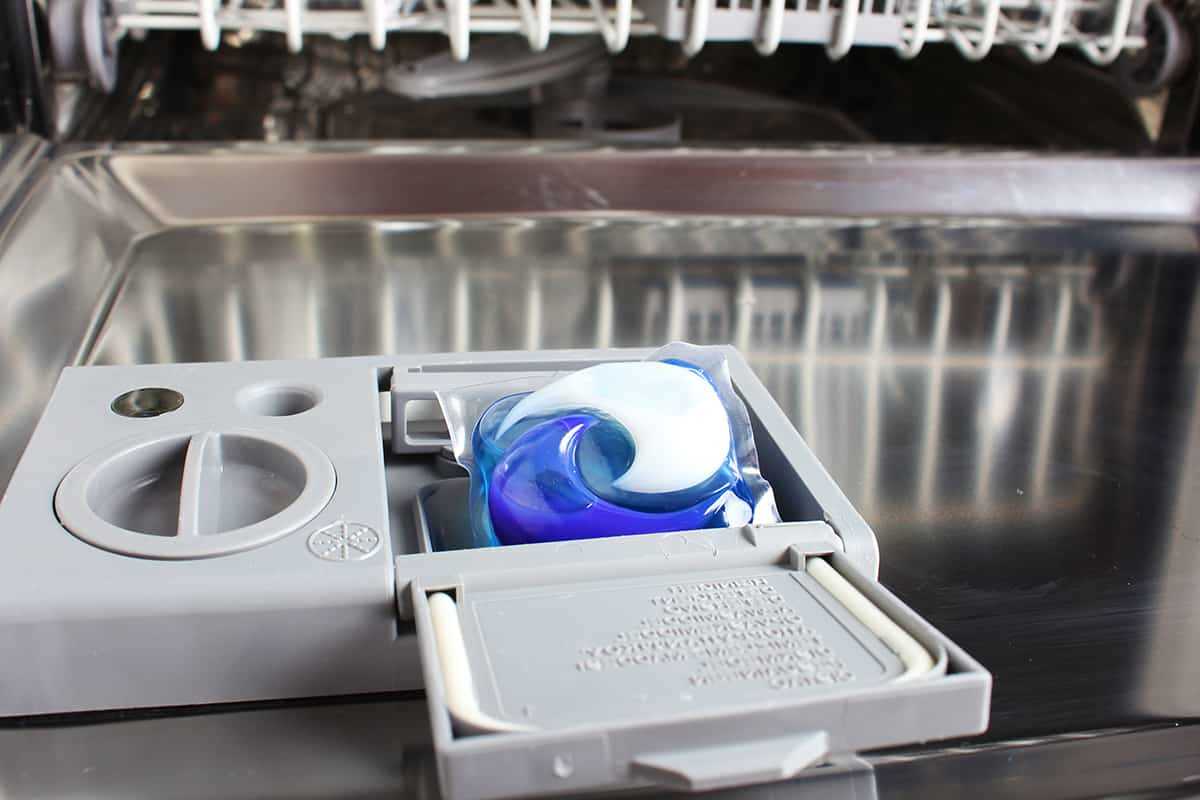
- The water temperature is too low: If the water in your dishwasher isn’t hot enough, it can prevent the soap from dissolving properly. To ensure the water temperature is not the problem, check the temperature setting on your water heater and make sure it is set to at least 120°F (49°C).
- The detergent dispenser is faulty: If the detergent dispenser is not opening or is malfunctioning, the soap won’t be able to dissolve and reach the dishes. Check if the dispenser is clogged, damaged, or stuck, and clean or replace it if necessary.
- Using low-quality dishwasher soap: Low-quality dishwasher soap may not dissolve properly, leading to soap residue on dishes. Consider switching to a higher quality detergent to improve the soap dissolving performance.
- The water flow is restricted: A restricted water flow can prevent adequate water from reaching the dishwasher, resulting in improper soap dissolution. Check the water inlet valve, water supply line, and water pressure to ensure proper water flow. If any of these parts are damaged or blocked, they may require repair or replacement.
- The dishwasher’s pump is defective: A defective dishwasher pump can cause insufficient water circulation in the dishwasher, preventing the soap from dissolving properly. If you suspect a faulty pump, you may need to call a professional technician to repair or replace it.
Hard Water
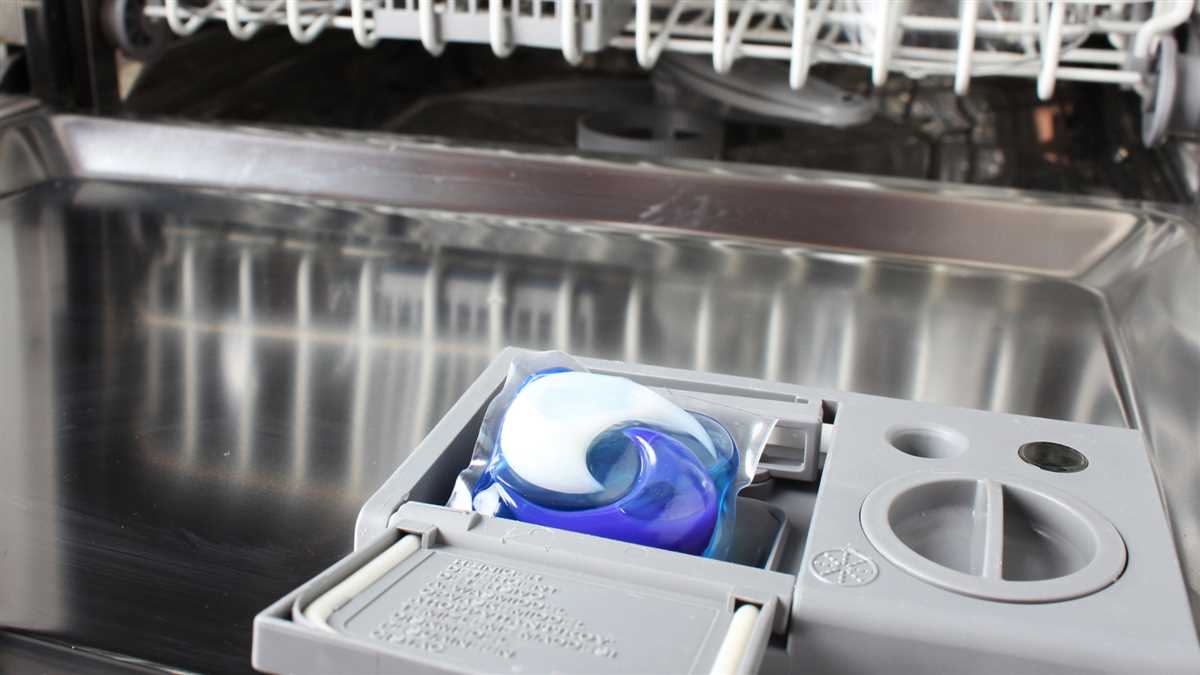
One common reason why dishwasher soap may not dissolve properly is hard water. Hard water contains a high concentration of minerals, such as calcium and magnesium, which can prevent the detergent from dissolving completely. As a result, you may notice that your dishes aren’t getting as clean as they should be.
If you’re experiencing this issue, there are several things you can do to address the problem:
- Use the right detergent: Look for dishwasher detergents that are specifically designed for hard water. These detergents contain ingredients that help to soften the water and improve the effectiveness of the cleaning process.
- Adjust the dishwasher settings: If your dishwasher has a water hardness setting, adjust it to reflect the level of hardness in your water supply. This will help the dishwasher adjust the amount of detergent needed for optimal cleaning results.
- Check the water temperature: Hard water can be more difficult to dissolve detergent at lower temperatures. Make sure your water heater is set to a higher temperature (around 120°F or 49°C) for better detergent performance.
- Clean the dishwasher: Over time, minerals from hard water can build up in your dishwasher, causing blockages and reducing water flow. Regularly clean the dishwasher, including the spray arms, pump, and filter, to remove any debris or mineral deposits that might be hindering the detergent’s dissolution.
- Consider using a rinse aid: Rinse aids are designed to help water sheet off of dishes more easily, preventing mineral deposits and improving drying performance. Using a rinse aid can also help to ensure that the dishwasher detergent dissolves properly.
- Test water hardness: If you suspect that hard water is the cause of your dishwasher soap not dissolving, you can have your water tested by a professional engineer or use a home testing kit. Knowing the exact hardness level of your water can help you determine the most appropriate fixes.
By addressing the issue of hard water, you can improve the performance of your dishwasher and ensure that your dishes come out clean and spotless after each wash cycle.
Clogged Dispenser
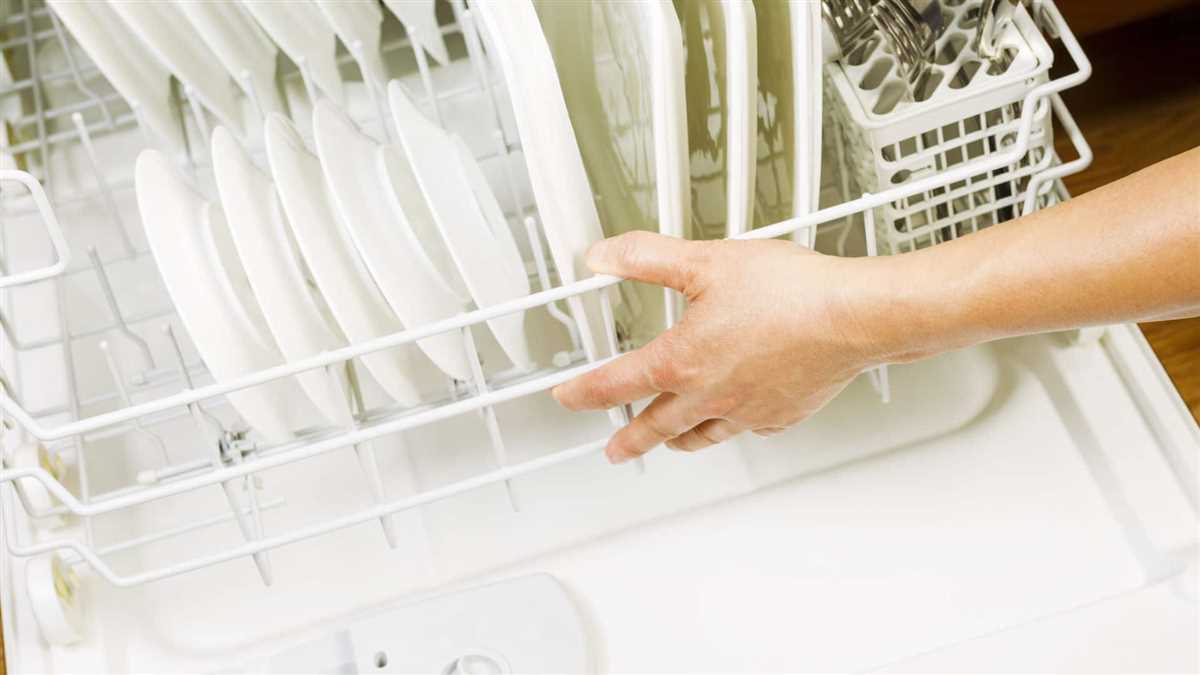
One possible reason for dishwasher soap not dissolving could be a clogged dispenser. The dispenser is responsible for releasing the detergent during the wash cycle. If it becomes blocked, the detergent may not be released properly, resulting in dishes not getting clean.
If you suspect that the dispenser is clogged, here are a few things you can try to troubleshoot the issue:
- Check the dispenser tray: Start by opening your dishwasher and inspecting the dispenser tray. Sometimes, the dispenser door may be blocked by leftover food or other debris. If you notice any obstructions, make sure to remove them.
- Inspect the dispenser mechanism: Take a closer look at the dispenser mechanism itself. It may be possible that a small part or component is broken or stuck, preventing the dispenser from opening properly. If you notice any visible issues, such as a broken latch or a stuck mechanism, you may need to replace or repair the dispenser.
- Investigate water flow: Low water pressure can also contribute to a clogged dispenser. Make sure that your dishwasher is connected to a water supply and that the water flow is sufficient. If you’re experiencing low water pressure, you may need to call a plumber to investigate the issue.
- Check for signs of a faulty valve: A malfunctioning water inlet valve can also cause detergent not to dissolve properly. If you’ve tried the above steps and are still having issues, it may be worth checking the valve. If it appears to be faulty, it will need to be replaced by a professional.
- Clean the dispenser: If none of the above solutions have helped, it’s possible that the dispenser itself is simply dirty or clogged. In this case, you can try cleaning it by running a dishwasher-safe detergent tablet or cleaning solution through a wash cycle without any dishes. This can help remove any built-up residue that may be causing the blockage.
If you’re not comfortable performing these troubleshooting steps yourself or if the issue persists, it’s always a good idea to call a professional dishwasher repair engineer or your dishwasher manufacturer’s customer service associates for further assistance. They will be able to determine the cause of the problem and recommend the appropriate repairs or next steps.
Insufficient Water Pressure
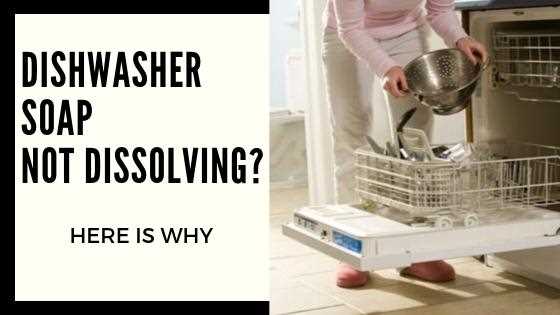
Another common reason why dishwasher soap may not be dissolving is insufficient water pressure. Dishwashers, like many other appliances, require a certain amount of water pressure to function properly.
If the water pressure in your home is too low, it can prevent the dishwasher from getting enough water to properly circulate and dissolve the soap. If you notice that your dishwasher is not filling with enough water or if the water does not appear to be circulating properly during the wash cycle, low water pressure may be the cause.
There are a few things you can do to troubleshoot and potentially fix this issue:
- Check the water inlet valve: The water inlet valve is responsible for allowing water to enter the dishwasher. If it is clogged or not working correctly, it can restrict the flow of water. Inspect the valve for any debris or blockages, and clean or replace it if necessary.
- Check the water pump: The water pump is responsible for circulating the water through the dishwasher. If it is not working properly, it can result in low water pressure. Inspect the pump for any signs of damage or malfunction, and consider calling a professional for a replacement if needed.
- Check your dishwasher’s water supply: Make sure that the dishwasher is properly connected to the water supply and that water is getting to the dishwasher. Check for any kinks or blockages in the water supply line and ensure that the water valve is fully open.
- Check for any missing or defective parts: Inspect your dishwasher for any missing or defective parts that may be impacting its performance. Look for any broken or damaged spring in the soap dispenser or any stopping mechanism that may prevent the soap from being dispensed properly.
- Call a professional: If you have tried the above fixes and are still experiencing low water pressure or soap not dissolving issues, it may be best to call a professional. They will be able to diagnose and fix any underlying problems with your dishwasher.
Remember, if you are not comfortable or confident in fixing the issue yourself, it is always recommended to leave it to the professionals. They have the expertise and knowledge to accurately diagnose and fix the problem.
If you have any comments or questions about this article or need further assistance in troubleshooting dishwasher soap not dissolving issue, please feel free to leave a comment below. We are here to help!
Wrong Dishwasher Detergent
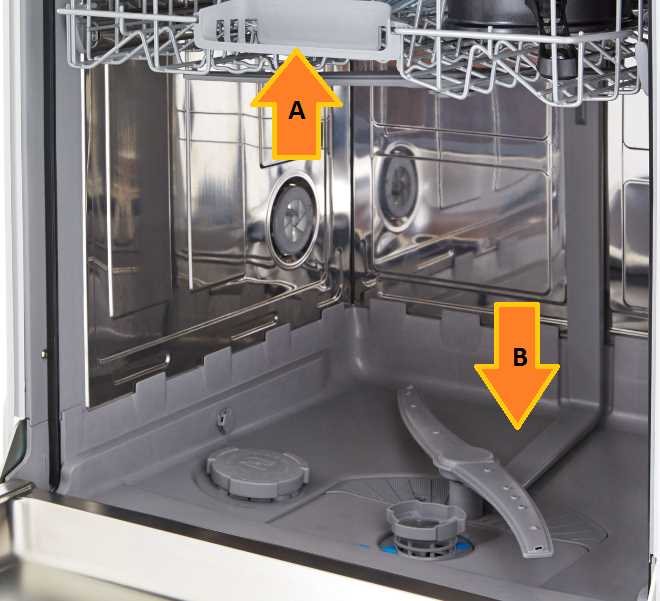
If your dishwasher soap is not dissolving properly, one of the possible causes could be using the wrong detergent. It’s important to investigate if you are using the correct type of detergent for your dishwasher.
At times, certain dishwasher soaps may not be suitable for your machine’s operation. To check if this is the case, verify if you are using a dishwasher detergent that is compatible with your specific dishwasher model and manufacturer’s recommendations.
If you are unsure about the compatibility of your dishwasher detergent, it is always helpful to consult the manufacturer or check the product packaging for any specific instructions or recommendations.
In some cases, using the wrong dishwasher detergent may result in the soap not dissolving properly during the wash cycle. This can lead to detergent residue on your dishes and ineffective cleaning.
One way to prevent this issue is to ensure that you are using the correct dishwasher detergent for your machine. It is also important to store your detergent in a cool and dry place, as extreme temperatures or moisture can affect its performance.
If you have been using the correct detergent and still experience issues with soap not dissolving, there might be other underlying problems with your dishwasher. It is advisable to contact a professional engineer to inspect your dishwasher and provide further troubleshooting and repair if necessary.
In conclusion, using the wrong dishwasher detergent can be one of the reasons why your dishwasher soap is not dissolving. Investigate if you are using the correct detergent, and if in doubt, consult the manufacturer or product packaging for guidance. Addressing this issue can help ensure that your dishwasher operates smoothly and efficiently, leaving your dishes clean and sparkling.
Low Water Temperature
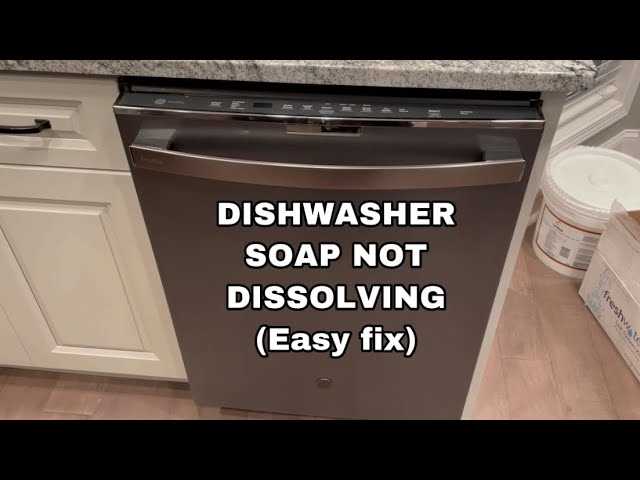
The water temperature in your dishwasher plays a vital role in dissolving the dishwasher soap properly. If the water temperature is too low, the soap may not dissolve completely, leading to poor cleaning results.
To test the water temperature, you can use a thermometer. Run your dishwasher on a normal cycle and let it fill with water. Open the door, insert the thermometer, and measure the temperature. The water temperature should ideally be between 120°F (49°C) and 140°F (60°C) for optimal soap dissolving.
If the water temperature is below the recommended range, there are a few possible causes:
- Heating element not working: The heating element in your dishwasher is responsible for heating the water. If it’s broken or not functioning properly, it may not be able to heat the water to the required temperature. In this case, you may need to consult a dishwasher repair engineer to fix the issue.
- Low water flow: If there is a lack of water flow or a reduced water pressure, the dishwasher may not be able to reach the desired temperature. Check the water supply line and valves to ensure they’re open and working correctly. If you’re unsure how to do this, it’s best to consult a professional.
- Blocked dishwasher arms: The dishwasher arms are responsible for spraying water onto the dishes for effective cleaning. If they are blocked or clogged with debris, they may not be able to distribute water evenly, resulting in low water temperature in certain areas. Clean the dishwasher arms thoroughly to prevent any blockages.
- Low-quality dishwasher detergent: Some low-quality dishwasher detergents may not dissolve properly in lower water temperatures. Consider using high-quality dishwasher detergent tablets or powders that are specifically designed to dissolve in lower temperatures.
In conclusion, if your dishwasher soap is not dissolving, low water temperature could be one of the reasons. Test the water temperature, check the dishwasher’s heating element, ensure proper water flow and circulation, and use high-quality dishwasher detergent to improve the soap dissolving process.
FAQ
My dishwasher soap doesn’t seem to be dissolving properly. What could be the issue?
There could be several reasons why your dishwasher soap is not dissolving properly. It could be due to a clogged detergent dispenser, hard water deposits, low water temperature, or using the wrong type of detergent.
What should I do if my dishwasher pod is not dissolving?
If your dishwasher pod is not dissolving, there are a few troubleshooting steps you can try. First, make sure that the water temperature is hot enough. You can also try pre-rinsing your dishes and checking for any obstructions in the dispenser. If the problem persists, you may want to try using a different brand of dishwasher pods.
Why is my dishwasher soap not dissolving even though I have checked for all the possible issues?
If you have checked for all the possible issues such as clogged dispenser and water temperature, and your dishwasher soap is still not dissolving, you may want to consider contacting a professional repair service. There could be an underlying problem with your dishwasher that requires expert attention.
Can using the wrong type of detergent cause my dishwasher soap not to dissolve?
Yes, using the wrong type of detergent can prevent your dishwasher soap from dissolving properly. Make sure you are using a detergent specifically designed for use in dishwashers. Using regular dish soap or hand soap can result in excess suds and poor dissolving.
What can I do to prevent my dishwasher soap from not dissolving in the future?
To prevent your dishwasher soap from not dissolving in the future, you can try a few things. First, make sure you are using the correct amount of detergent. Too much or too little detergent can affect dissolving. You can also try using a dishwasher cleaner periodically to remove any buildup in the dispenser. Additionally, using a dishwasher with a built-in water softener can help prevent mineral deposits that can interfere with dissolving.













